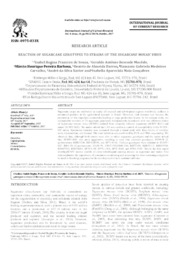Reaction of sugarcane genotypes to strains of the sugarcane mosaic virus.
Reaction of sugarcane genotypes to strains of the sugarcane mosaic virus.
Autoria: SOUZA, I. R. P. de; MACEDO, G. A. R.; BARBOSA, M. H. P.; BARROS, B. de A.; CARVALHO, S. G. M.; XAVIER, A. da S.; GONÇALVES, I. A. M.
Resumo: Sugarcane crops are cultivated in nearly all tropical and sub-tropical regions worldwide andhave a prominent position in the agricultural scenario in Brazil. However, viral diseases can threaten the production of this important commodity leading to large production losses. In the present study, we evaluatedthe reaction of 20 sugarcane genotypes independently inoculated with two different strains of Sugarcane mosaic virus (SCMV) isolated from naturally infected sugarcane (SCMV-SGC) and maize (SCMV-MZ). The maize inbred line L19 was used as a control of susceptibility to the SCMV-MZ strain. Symptoms intensity was evaluated through a visual scale with three levels of severity: weak, intermediate, and intense. The viral infection was confirmed by PCR and DNA sequencing. We observed that, although both strains were able to infect sugarcane genotypes and the maize inbred line, SCMV-SGC was more aggressive, resulting in only four resistant genotypes: IN84-58 (S. spontaneum), RB855536, RB 928064, and SP71-6163. Thirteen genotypes were resistant to SCMV-MZ: IN84-58 (S.spontaneum), NA56-79, CB47-355,CB49-260, RB72454, RB855113, RB855536, RB867515, RB928064, SP70-1143, SP71-1406, SP71-6163, and SP81-3250. This is the first report showingSCMV strains capable of cross-infectingand causing mosaic in sugarcane and maize. Our data emphasize the importance of continuous monitoring and screening for virus resistantgenotypes to be used in breeding programs for the development of new resistant cultivars.
Ano de publicação: 2017
Tipo de publicação: Artigo de periódico
Unidade: Embrapa Milho e Sorgo
Palavras-chave: Cana de açucar, Doença de planta, Mosaico
Observações
1 - Por padrão são exibidas publicações dos últimos 20 anos. Para encontrar publicações mais antigas, configure o filtro ano de publicação, colocando o ano a partir do qual você deseja encontrar publicações. O filtro está na coluna da esquerda na busca acima.
2 - Para ler algumas publicações da Embrapa (apenas as que estão em formato ePub), é necessário ter, no celular ou computador, um desses softwares gratuitos. Sistemas Android: Google Play Livros; IOS: iBooks; Windows e Linux: software Calibre.
Acesse outras publicações
Acesse a Base de Dados da Pesquisa Agropecuária (BDPA) para consultar o acervo completo das bibliotecas da Embrapa.

